
When was the last time you looked at the world map? What do “Malta f’Qalbna” and “Flimkien għal Pajjiżna” matter on the continental scale? We have every reason to care about larger European politics because we are directly affected by it.
by Raisa Galea
Collage by the IotL Magazine
[dropcap]D[/dropcap]ear reader, beware: unless you are sufficiently drunk, venture no further into this text. The freak show of the European Parliament and local council elections—as well as Maltese politics in general—make no sense to a sober person.
1. Missing the Point and Scale Entirely
Perhaps, the best summary of the elections so far was the note “We deserve better!” stuck on doors of the Nationalist Party clubs. I can’t agree more. We certainly do deserve better. “We” as concerned citizens, as a country, and—most importantly—as a planet and mankind deserve better than a fast-approaching eco collapse and degrading quality of life, powered by aggressive exploitation of nature and fellow humans.
The success of the Greens (+19 seats, 69 in total) and the increased representation of the far right (+6 seats, 54 in total) as well as a declining presence of the centrist parties at the European Parliament send a clear message. Voter’s priorities—at a European level, at least—are shifting. The political zeitgeist is now defined by a struggle between two major issues—climate change, on the one side of the spectrum, and the fear of immigration, on the other.
As it usually happens in Malta, we couldn’t bother to see beyond our nose and thus missed the significance of these elections for Europe and the rest of the world.
When was the last time you looked at the world map? What do Labour, Nationalists, “Malta f’Qalbna” and “Flimkien għal Pajjiżna” matter on the continental scale? Alas, a sense of scale is what we lack most, hence we are unable to conceive issues of a dimension exceeding 45×13 km. Why can’t we see that this archipelago is just a speck of dust caught in a whirlwind of global politics?
As it usually happens in Malta, we couldn’t bother to see beyond our nose and thus missed the significance of these elections for Europe and the rest of the world.
Our economic and social state of affairs is largely predetermined by decisions at the European and global level. We have every reason to care about larger European politics because we are directly affected by it. The effect of the neoliberal fixation on economic growth is all too visible—and devastating—here.
![]()
We are choking on growth,
suffocating with exhaust,
and yet we demand more of the same.
![]()
We’ve reached the sky and poked it with our index finger—there is no more room left for growth. Land reclamation, you say? Fuck off, we should reply!
Instead of trying to impress the rest of Europe with our GDP numbers, Maltese MEPs should truly take this archipelago—what’s left of it anyway—to their heart. We cannot preserve Malta as a livable space unless the system that treats humans, nature and beauty as a resource to be converted into profit gives way to another, built on a premise of flourishing within ecological limits—and for everyone, not just the select few.
The cake cannot grow further—the climate change is happening as we speak! And since the cake cannot grow, we must ensure it is cut in a fair way. If followed by a redistribution of tax profits across Europe, tax harmonisation could be our lifeline: it could guarantee decent standards of living and save the islands from the axe of more growth.
The cake cannot grow further—the climate change is happening as we speak! And since the cake cannot grow, we must ensure it is cut in a fair way.
Unfortunately, none of the candidates had the courage to suggest a clear path to economic transformation. Clearly, Malta’s real number one taboo is not debating abortion but questioning our tax regime.
2. Abortion, Plastic Straws and Best PR Strategies
Disappointingly, all of the candidates were pretty much united in their opposition to tax harmonisation—the key issue by all means—thus, the difference between them was of a degree, not a kind. It is no coincidence that the post-electoral analysis in the national media mostly focused on the candidates’ and parties’ strategy and not essence: the latter seemed to be rather absent in most cases.
The defining rift between the parties as well as within them was their (still pretty similar) stand on abortion. Since none of the parties are formally in favour of legalising abortion, their discord was mainly on whether or not the issue could be debated at all.
Mina Tolu, an MEP candidate from Alternattiva Demokratika (845 first preference votes) was the first politician to welcome a debate on abortion in February 2019. This courageous move enticed a storm of criticism from the general public and fellow Green politicians alike, which led to the internal split, followed by the resignation of AD’s veteran Arnold Cassola.
While the Labour Party stuck to its weapon of preference—portraying the Nationalist candidates as national enemies and traitors—the PN went all out calling the PL what many of us wished them to be—socialists with a cunning plan to legalise abortion. The fear mongering was a poor strategy, nevertheless: collectively, the Nationationalist party candidates obtained 37.9% of votes (versus 54.29% gained by the Labour party).
Strange enough, during the final days of the electoral marathon, a pro-choice stance became a trademark of an MEP candidate from the Democratic Party (PD), Camilla Appelgren (3,053 votes). An iGaming employee who is known primarily for her cleanup activism, Camilla altered her viewpoint on abortion at least three times in four months.
Three days before the elections, Camilla challenged PD leader Godfrey Farrugia on his fundamentalist pro-life stance and, few hours later, promptly quit her Facebook account in response to alleged death threats (albeit made a quick come back a day after the elections). Bizarrely, Appelgren attempted to trivialise Daphne Caruana Galizia’s murder by drawing a comparison between the threats she allegedly received online and the journalist’s tragic fate.
Strange times we live in—in 2019, quitting a Facebook account makes news headlines and, stranger even, withdrawing from social media alone can apparently safeguard a person from a car explosion (for the whole 4 days!)

Undoubtedly, Camilla was one of the campaign’s most notable protagonists and a new phenomenon for Maltese politics that is worth looking into.
Strange times we live in—in 2019, quitting a Facebook account makes headlines. Stranger even, withdrawing from social media alone can apparently safeguard a person from a car explosion.
Her relative success offers a few PR tricks to learn from: the winning recipe seems to be a mix of green buzzwords with a compulsory ingredient of presenting herself as someone who acts rather than just talks. Otherwise generous with words, she slyly abstained from commenting on tax harmonisation and stuck to illuminating the electorate on the intrinsic dangers of plastic straws instead.
Prospective politicians, take note: cleanups are a splendid platform for political campaigning; they help to achieve both—to appear as though you are ‘doing something about the problem’ and to simultaneously avoid discussing the economic and power relations responsible for the sorry state of affairs.
In most cases, activism boils down to being seen as doing something, and moving rubbish away from visible spaces to landfills—out of sight, out of mind—organically blends with the window-dressing style of current neoliberal politics. Cleanups exonerate the anti-ecological status quo. They trick us into battling consequences instead of discerning the causes of climate change and demanding bold climate action.
Moving rubbish away from visible spaces to landfills—out of sight, out of mind—organically blends with the window-dressing style of current neoliberal politics.
We should have learnt that ‘doers’ in politics can do much harm. Look no further than Ian Borg, the Minister for Transport—he’s a ‘doer’, too. His futile attempts to solve Malta’s transport conundrum by widening roads and bulldozing through the countryside are, in fact, branded as #GettingThingsDone.
An inventive media strategist, Camilla Appelgren is indeed a female hybrid of Justin Trudeau (the sweet talker) and Ian Borg (the ‘doer’). One day she self-identifies as a liberal centrist, a day later—equates herself to radical eco-socialist Greta Thunberg. Appelgren’s perpetual political metamorphosis could itself be a stable source of renewable energy.
Right you were, concerned Nationalist party supporters. We do indeed deserve better… than a bamboo straw environmentalism on the brink of the climate calamity.
3. Longing for a Bold and Brave Left-Wing Alternative
If European politics seems to be shifting away from the centre, towards the left and the right, the same is not happening in Malta. The largest third party here is Nazi-style Imperium Europa, whose Holocaust-denying leader received a total of 8,335 votes, 64% of which were non-transferrable. While far-right views are gaining momentum in Malta, a bold, appealing and ecologically sound left-of-center alternative is nowhere to be seen.
Although the growing support for Lowell is certainly disturbing, the eagerness of many well-meaning individuals to mistake a window-dressing ‘cleanup’ environmentalism for the Green New Deal or a proper climate action is almost as distressing.
Malta urgently needs a bold and brave left-wing alternative! The Green party Alternattiva Demokratika might still be in time to challenge the budding far-right.
Malta urgently needs a bold and brave left-wing alternative! The Green party Alternattiva Demokratika might still be in time to challenge the budding far-right. Although vague on pressing issues like tax harmonisation, degrowth and redistribution of tax profits, Mina Tolu—the AD’s rising star—was the most left-leaning candidate, with her supporters being the least likely to transfer their votes to the far-right.
However, 16 voters of the Christian conservative Alleanza Bidla party listed Tolu as their second preference candidate. This is a message of hope—if armed with tangible proposals for improving our well-being and enough courage to address these matters firmly, Mina could attract voters critical of the status quo who currently lack an alternative. And with more support, demands could become more far-reaching.
Leave a Reply